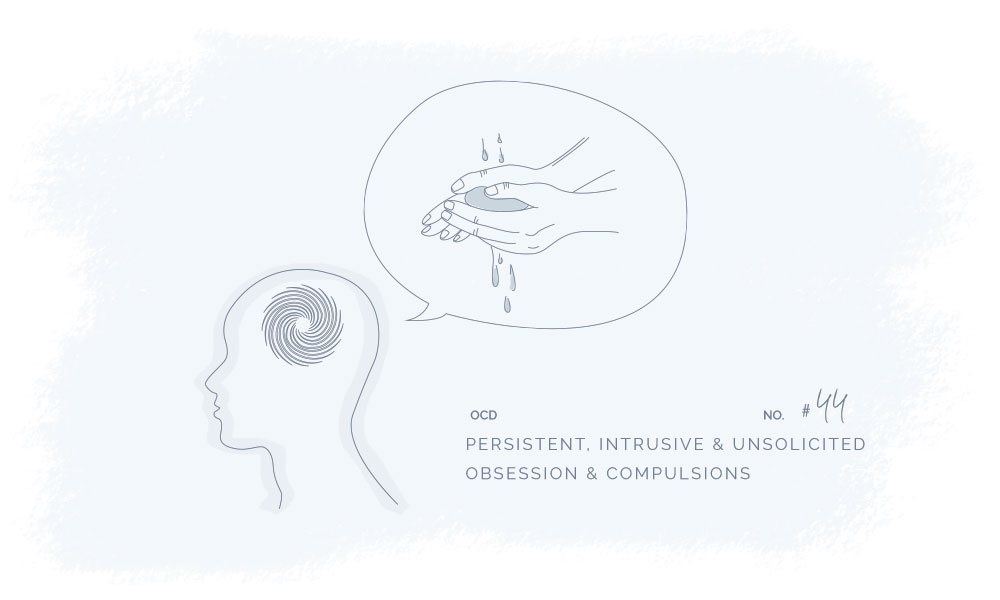OCD
Category
Behavioral, Neurodevelopmental, Psychiatric
REVIEWED BY
Our Biomedical Scientist
Reviewed based on
Literature Review
Last update
November 2020

What is OCD
Obsessive-compulsive disorder (OCD) is a mental health disorder characterized by persistent, intrusive, and unsolicited thoughts and fears, commonly known as obsessions. People with OCD can also experience repetitive behavior known as compulsions. These obsessions and compulsions may cause distress, anxiety, and interfere with many aspects of life.1
Symptoms
People with OCD can experience repeated and intrusive thoughts which may lead to compulsive behavior or rituals in order to ignore or avoid obsessions.1
Often, symptoms belong to one of the following main themes:
- Fear of contamination
Example: Fear of contamination occurs when other people have been in contact with the same object as a person with OCD (i.e. touching the same object) - Difficulty handling uncertainty, risk, or the future without performing rituals
Example: Doubts – Are the door locked? Double-checking - Excessive need for systems, tidiness, and symmetry
Example: Intense distress when order is lacking - Avoidance of situations that may trigger obsessions
Example: Difficulties to shake hands - Dreadful thoughts involving losing control and harm yourself and others
Cause
The exact cause of OCD is not yet known. However, there are several risk factors that could be involved in the development of the disorder:1
- Biology
Changes in the body’s natural chemistry and brain functions - Heredity
Genetics may play a role but specific genes involved in OCD development remain to be elucidated - Learning
Learning about obsessive fears and compulsive behavior from family members
Risk factors1
Factors that can increase the risk of OCD are:
- Traumatic and/or stressful life events
Distressing life events like divorce, death of loved ones, job loss, etc. - Family history
If family members have OCD there is a higher chance for a person to develop OCD (i.e. via genetics) - Other mental health disorder
Depression, tic- and/or anxiety disorder may increase the risk of developing OCD
The connection between Cannabinoids & OCD
Studies find that CBD and THC may have great therapeutic potential and may be used to help treat OCD. CBD and THC are well-known cannabinoids, however, they do not have the same psychoactive effects. THC is psychoactive while CBD does not possess psychoactive effects. According to WHO guidelines, the cannabidiol CBD is generally well tolerated with a good safety profile.
Preclinical studies propose that cannabinoid receptors are significantly expressed in most parts of the main circuitry associated with OCD and enhancement of the cannabinoid’s receptor CB1 function may result in anti-compulsive behavior activity, suggesting potential treatment opportunities with cannabinoids in OCD.2
Preclinical research has shown that the cannabinoid CBD may play a role in the treatment of OCD. However, as there is a significant overlap between OCD, anxiety, PTSD, ADHD, and autism spectrum disorders, the cannabinoid THC may possess therapeutic potential.
On the contrary, it was also suggested that there is a correlation between cannabinoids and the induction of psychiatric disorders.
However, increasing evidence suggests that cannabinoids exhibit positive effects by inhibiting obsessive behavior.3
The literature discussion is an overview of the published results from scientific studies investigating if and how cannabinoids can be beneficial in the treatment of OCD. The overview will be updated regularly to ensure the newest and most accurate information.
Mice studies show that CBD effectively inhibit OCD symptoms
Several studies observed that cannabis use is connected to OCD. 4,5,6
In mice, obsessive-compulsive behavior was effectively inhibited by CBD. 7
In mice, marble-burying behavior (MBB; behavioral model to evaluate OCD) was suppressed by low doses of anandamide[/simple_tooltip (1-10 μg/mouse) or its analogs (AM404 or URB597; 1-5 μg/mouse), while MBB was increased by high doses of these compounds (40 or 20 μg/mouse). 8
Clinical trials are research studies that examine new treatments and evaluate their effects on human health outcomes.
Today, we are not able to provide any clinical trials about cannabinoids and OCD.
- https://www.mayoclinic.org/diseases-conditions/obsessive-compulsive-disorder/symptoms-causes/syc-20354432
- Casarotto, P.C., (2015). “Chapter 15 – Cannabinoids and obsessive-compulsive disorder”.https://www.sciencedirect.com/science/article/pii/B9780124170414000151?via%3Dihub
- https://ghmedical.com/endocannabinoid-system/diseases/ocd
- Alwis, D.D., Et Al., (2014). ” ADHD Symptoms, Autistic Traits, and Substance Use and Misuse in Adult Australian Twins”. https://www.ncbi.nlm.nih.gov/pmc/articles/PMC3965675/
- Bidwell, L.C., Et Al., (2014). ” Childhood and current ADHD symptom dimensions are associated with more severe cannabis outcomes in college students”. https://pubmed.ncbi.nlm.nih.gov/24332802/
- Loflin, M., Et Al., (2014). ”Subtypes of attention deficit-hyperactivity disorder (ADHD) and cannabis use”. https://pubmed.ncbi.nlm.nih.gov/24093525/
- Deiana, S., Et Al., (2012). “Plasma and brain pharmacokinetic profile of cannabidiol (CBD), cannabidivarine (CBDV), Δ⁹-tetrahydrocannabivarin (THCV) and cannabigerol (CBG) in rats and mice following oral and intraperitoneal administration and CBD action on obsessive-compulsive behaviour”. https://pubmed.ncbi.nlm.nih.gov/21796370/
- Umathe, S.N., Et Al., (2012). ” Endocannabinoid analogues exacerbate marble-burying behavior in mice via TRPV1 receptor”. https://pubmed.ncbi.nlm.nih.gov/22248639/
CANNABINOIDS & RECEPTORS
Below you find the plant cannabinoids, cannabinoid receptors, and endocannabinoids that are associated with the potential therapy.
If you have any further information relevant to the connection between OCD and cannabinoids or find any of the information inaccurate, outdated or incomplete please contact us here.

